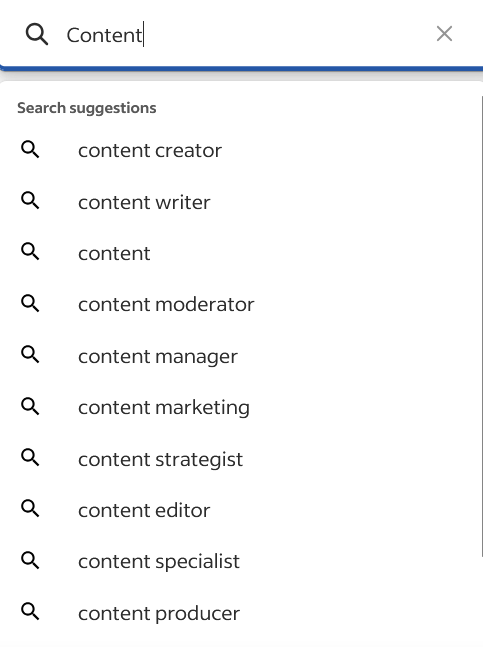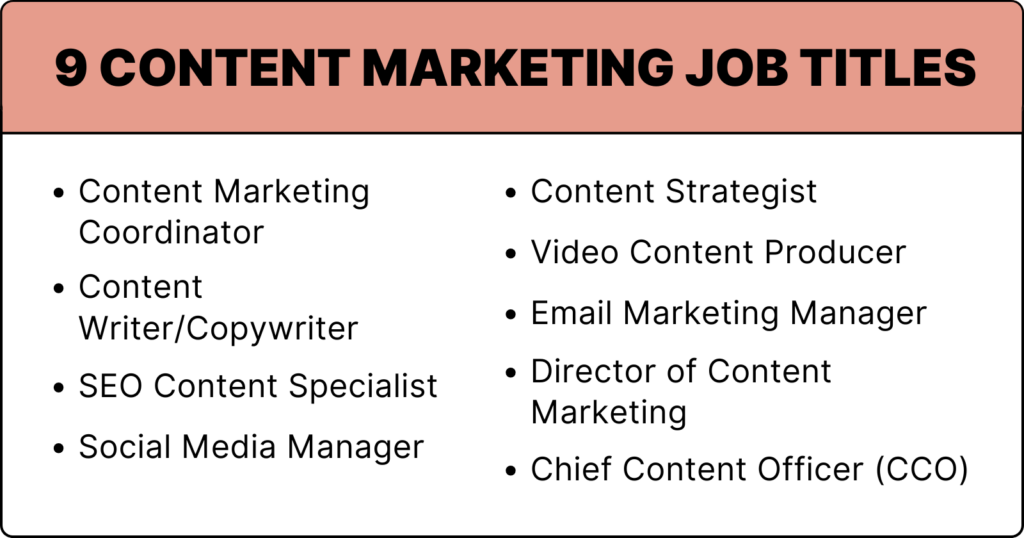I don’t know about you, but content marketing job titles are starting to get a little confusing. As someone who was recently laid off, searching through all the different available titles to find what I know I can do was a challenge I wasn’t expecting.

Just a few of the content marketing job titles I’ve come across on Indeed alone!
I hate to be the bearer of “Back in my day…,” but when I was first starting, Joe Pulizzi had just founded the Content Marketing Institute. University classes barely focused on the burgeoning field. One writing for advertising course I took in 2011 had one assignment dedicated to writing blogs for a company we admired. That was it.
Today, the content marketing industry has significantly expanded, now including roles for everything from your standard content specialist to content producers, video production teams, podcast scriptwriters and more. Even your typical content marketing manager and other content marketing roles have gone above and beyond writing tasks to include video. And no wonder: according to Semrush, 45% of content marketers believe video performs best when compared to other short-form articles.
So what are the content marketing roles you need to know today? We’ve broken down nine of the most common roles and what you can expect from each.
9 Content Marketing Job Titles to Know
I got into content marketing because it was, let’s face it, fun. It still is! I’ve helped clients write articles that slip in references to Star Trek, used Taylor Swift memes to get people interested in data privacy management and created my own Spotify Wrapped as an industry report. And I got paid to do this!
Maybe those aren’t your idea of fun. Maybe your idea of fun is editing a video or adding sound to the beginning of a podcast. Maybe you absolutely thrive on making sure people meet their deadlines or creating detailed calendars. There are so many different content marketing careers, and finding the best one for you starts with knowing some of the most popular job titles.
Content Marketing Coordinator
A content marketing coordinator is an entry-level role that supports the execution of a brand’s content strategy. They handle scheduling, publishing and tracking content performance across digital marketing assets, including blogs, gated content, social media and email campaigns.
This role requires strong organizational skills, familiarity with content management systems like WordPress or HubSpot, and a basic understanding of SEO and analytics. It’s an excellent position for those who want to gain hands-on experience in content marketing while collaborating with other roles, including writers, designers and strategists. Depending on the role, the content marketing coordinator may even take on some of these responsibilities as well.
Content Writer/Copywriter
Okay, before we get started with this role, it’s critical you know that content writing and copywriting are not the same thing. Content writing is primarily educational and more long-form, while copywriting is focused on sales and is usually short-form. However, especially in more entry-level positions, these roles are often combined into one copywriter position.
When they are combined, these team members are responsible for writing all content that drives engagement and conversions. They’ll create content, such as blog posts, website copy, email campaigns, ad copy and social media captions, ensuring the messaging aligns with the brand’s overall voice and marketing goals. A successful writer needs excellent storytelling and editing skills, the ability to adapt to different tones and audiences and a solid grasp of SEO principles. While creativity is key, writers also need to understand how to craft persuasive content that supports business objectives.
SEO Content Specialist
An SEO content specialist bridges the gap between content creation and search engine optimization, ensuring a company’s content ranks well and attracts organic traffic. They conduct keyword research, optimize on-page elements like meta descriptions and headers and analyze search performance using tools like Google Analytics and SEMrush. This role requires a deep understanding of search engine algorithms and the ability to write optimized yet reader-friendly content.
Given how much search engines have already evolved — especially with the rise of AI search — SEO Content Specialists need an analytical mindset so they can stay ahead of trends and algorithm updates to keep content visible and competitive.
Social Media Manager
I grappled with adding this role. In my experience, social media and content were often either two completely separate roles with little focus on content marketing, or social media was tacked on as an afterthought to the work a content specialist or coordinator was doing. (I am not saying that was correct!) However, as social media has evolved, it’s grown beyond a tool for content maximization to a standalone channel that can promote everything from new products and tools to the brand itself.
As hinted at, a social media manager oversees a brand’s presence on social media, creating and curating content that fosters engagement and community growth. They develop social strategies, schedule posts, analyze performance metrics and collaborate with designers, copywriters and others to craft compelling content. If you’re interested in this role, success will require creativity, trend awareness and strong communication skills. Since social media is fast-paced, a Social Media Manager must be adaptable, data-driven and skilled at responding to audience interactions in real-time.
Content Strategist
A content strategist plays a critical role in defining a brand’s content goals, target audience personas and distribution plans. They focus on aligning content with business objectives, ensuring every blog post, email campaign, case study or video serves a clear purpose.
Content strategy requires a combination of creative thinking and analytical skills. Strategists must work across the organization — with teams ranging from leadership to sales to product teams — to build the content marketing plan. Once that’s complete, they then have to develop content calendars, measure performance and refine those strategies based on audience engagement and industry trends. Experience with content analytics tools and a strong understanding of user behavior are essential for success in this position.
Video Content Producer
A video content producer leads the planning, production and editing of video content for marketing campaigns, social media and brand storytelling. They handle everything from scripting and filming to editing and optimizing videos for different platforms.
This role requires technical proficiency with video editing software like Adobe Premiere Pro or Final Cut Pro, as well as an understanding of visual storytelling and audience engagement. Since video is one of the most powerful forms of digital content, a video content producer must be able to create compelling narratives that drive brand awareness and engagement.
Email Marketing Manager
I’ve seen email marketing work within either content marketing or demand generation, so if this role appeals to you, it might be good to have some understanding of both disciplines. An email marketing manager specializes in creating and executing email campaigns that nurture leads and retain customers. They focus on audience segmentation, personalization and automation to maximize open rates and conversions.
Being an email marketing manager requires expertise in email marketing tools like Mailchimp, HubSpot or Klaviyo, as well as strong copywriting and A/B testing skills. A successful email marketing manager knows how to craft compelling subject lines, optimize email deliverability and analyze performance metrics to improve campaign effectiveness.
Director of Content Marketing
A director of content marketing oversees the entire content strategy for a brand, ensuring all content efforts align with the organization’s business goals and drive measurable results. Depending on the size of the company, they lead a marketing team of writers, designers and strategists and manage content marketing strategies, editorial calendars, content production and performance tracking. Since this is a leadership role, you’ll need to have had a few of the aforementioned roles in the past. And a cursory glance at LinkedIn’s current director of content marketing roles shows a requirement of at least 8-10 years in content marketing. They may report into a chief content officer (CCO) or the chief marketing officer (CMO), depending on the organization’s structure.
This role requires strong leadership skills, a deep understanding of content marketing best practices and experience with multi-channel content distribution. A director of content marketing must balance creativity with data-driven decision-making, ensuring content not only engages audiences but also contributes to business growth.
Chief Content Officer
A chief content officer (CCO) is the highest-ranking content marketing role, responsible for a company’s entire content vision, from media production to distribution. They develop long-term content strategies, oversee brand storytelling efforts and ensure content plays a key role in business growth.
This executive-level position requires extensive experience in content marketing, media production and digital strategy. A CCO must be an innovative leader who understands audience behavior, emerging content trends and how to leverage content to generate revenue and brand influence.

Which Content Marketing Role Fits You?
Content marketing isn’t just about cranking out blogs or posting memes. (Although, let’s be honest, a well-timed meme can do wonders.) It’s a field packed with opportunities for storytellers, strategists and digital wizards alike. Whether you’re the wordsmith who thrives on crafting killer copy, the SEO geek obsessed with climbing Google rankings or the big-picture thinker plotting world domination one content campaign at a time — there’s a role for you.
The best part? Content marketing job titles, and the jobs themselves, are constantly evolving. AI is shaking things up, video is bigger than ever and brands are investing more in authentic, audience-driven storytelling. If you’ve been eyeing a new content role or dreaming of that next big promotion, now’s the time to go for it.






